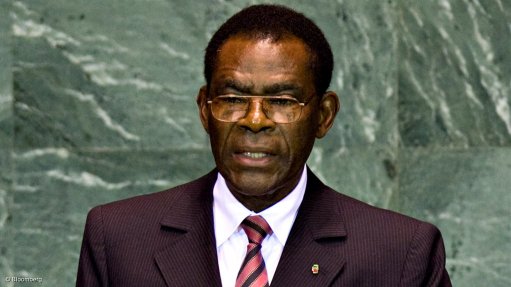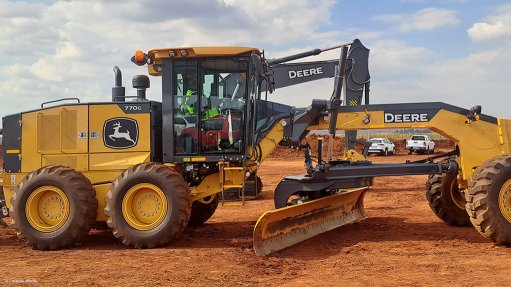Africa must ensure greater developmental returns from infrastructure roll-out
The bargaining power of individual African countries to both accelerate infrastructure delivery and insist upon higher levels of localisation, technology transfers and skills development can only be achieved through “united action”, South Africa’s Public Enterprises Minister Malusi Gigaba told infrastructure investors last week.
Gigaba is overseeing State-owned companies such as Eskom and Transnet that are spend-ing billions on new power and transport infrastructure and which have shareholder compacts stipulating that they maximise the employment, industrial and skills development spin-offs from the projects they implement.
Addressing the Africa Infrastructure Conference in Johannesburg, he argued that, while “Chinese pragmatism” had facilitated infrastructure and broader investment in a range of African countries, the lack of institutional preconditions for such projects had resulted in negligible local skills, technology and business development.
“There are examples where armies of Chinese skills and workers have been shipped in to construct the infrastructure,” Gigaba lamented, while acknowledging the ongoing tension between contributing to an African development process and the desire to con-struct the infrastructure as rapidly as possible.
There was, therefore, a need to scrutinise the value of trade, which was increasingly dominated by Asian countries, with China currently representing a third of Africa’s trade. “Africans must be cautious of shifting from over-reliance on Western markets to over-reliance on Eastern markets in terms of both trade and investments.”
Instead, African leaders should seek greater benefits from the Brazil, Russia, India, China and South Africa, or Brics, forum and “we must not sell our souls in order to receive investments from anywhere in the world”.
Through greater unity, Africa would gain more than was the case when individual small countries engaged in an “ugly contest” for investments.
The dearth of energy, transport, communi-cations and water infrastructure is viewed as a key constraint to raising the levels of growth and development across the continent, while colonial patterns of mine-to-port infra-structure development continue to weigh on intraregional trade prospects and undermine industrialisation ambitions.
In fact, a recently released United Nations Conference on Trade and Development report shows that trade between African countries has declined as a share of the continent’s total trade, despite rising to a record $130.1-billion in 2011, and remained well below levels being achieved in other territories.
The ‘Economic Development in Africa Report 2013’ urged the adoption of ‘devel-opmental regionalism’, encompassing greater cross-border cooperation and initiatives such as the provision of regional infrastructure to bolster intra-African trade, which it says holds material jobs and growth potential.
“Intra-African trade and investments must grow and we must begin to trust in our own capabilities,” Gigaba averred. But any increase in intraregional trade would be premised on individual country’s expanding their productive capacities and diversifying their economies away from a dependency on extractive resources.
The proposed North-South Corridor, which is being overseen on behalf of the African Union by President Jacob Zuma, was held up as a ‘blueprint’ for regional integration. He said it would create links from the resource-rich hinterland to key ports, connect markets with a combined population of 200-million people and develop the power capacity to establish manufacturing and agroprocessing capabilities at key nodes.
South Africa had institutionalised the pro- gramme by including it as a Strategic Inte-grated Project, known as Sip 17, which was being overseen by the Presidential Infra-structure Coordinating Commission.
But African governments also needed to sharpen indigenous “intellectual capital” to optimise the infrastructure development process, as well as to create innovative funding solutions for what was currently estimated as a $93-billion yearly investment deficit.
“Infrastructure funding is becoming increas-ingly more difficult to acquire,” Gigaba warned, noting that many traditional sources were under pressure in light of the economic crisis, while public budgets were becoming more and more strained.
The idea of infrastructure bonds, as well as directing African pension-fund resources towards African infrastructure projects was again floated. In fact, Gigaba indicated that South Africa was currently exploring various funding models, including the creation of a national infrastructure fund.
A new procurement mind set was also required, whereby infrastructure was purchased on a life-cycle-cost basis, rather than on a product basis.
“This means that we need to ensure that the procurement includes operational training as well as the establishment of relevant maintenance infrastructure, as well as the localisation of maintenance technologies and skills. “This is the bare minimum that is required to ensure that the operations of the infra-structure will be sustainable.”
Comments
Press Office
Announcements
What's On
Subscribe to improve your user experience...
Option 1 (equivalent of R125 a month):
Receive a weekly copy of Creamer Media's Engineering News & Mining Weekly magazine
(print copy for those in South Africa and e-magazine for those outside of South Africa)
Receive daily email newsletters
Access to full search results
Access archive of magazine back copies
Access to Projects in Progress
Access to ONE Research Report of your choice in PDF format
Option 2 (equivalent of R375 a month):
All benefits from Option 1
PLUS
Access to Creamer Media's Research Channel Africa for ALL Research Reports, in PDF format, on various industrial and mining sectors
including Electricity; Water; Energy Transition; Hydrogen; Roads, Rail and Ports; Coal; Gold; Platinum; Battery Metals; etc.
Already a subscriber?
Forgotten your password?
Receive weekly copy of Creamer Media's Engineering News & Mining Weekly magazine (print copy for those in South Africa and e-magazine for those outside of South Africa)
➕
Recieve daily email newsletters
➕
Access to full search results
➕
Access archive of magazine back copies
➕
Access to Projects in Progress
➕
Access to ONE Research Report of your choice in PDF format
RESEARCH CHANNEL AFRICA
R4500 (equivalent of R375 a month)
SUBSCRIBEAll benefits from Option 1
➕
Access to Creamer Media's Research Channel Africa for ALL Research Reports on various industrial and mining sectors, in PDF format, including on:
Electricity
➕
Water
➕
Energy Transition
➕
Hydrogen
➕
Roads, Rail and Ports
➕
Coal
➕
Gold
➕
Platinum
➕
Battery Metals
➕
etc.
Receive all benefits from Option 1 or Option 2 delivered to numerous people at your company
➕
Multiple User names and Passwords for simultaneous log-ins
➕
Intranet integration access to all in your organisation


















